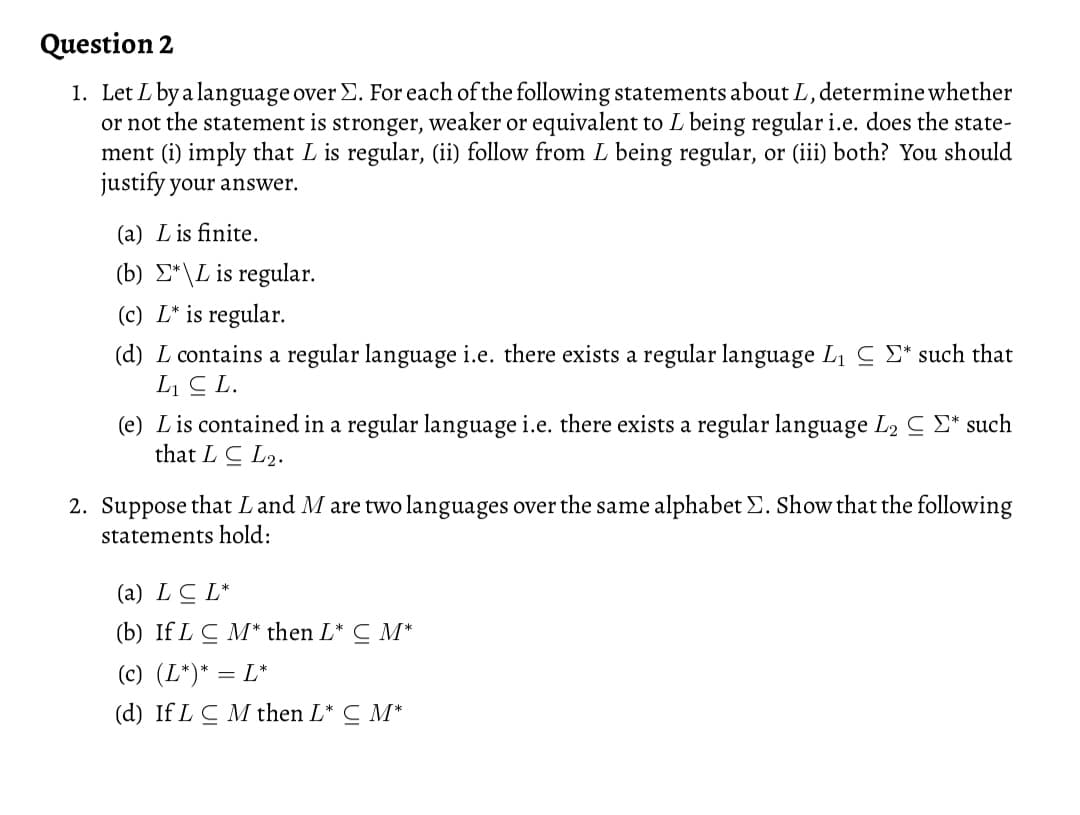Question 2 1. Let L by a language over E. For each of the following statements about L, determine whether or not the statement is stronger, weaker or equivalent to L being regular i.e. does the state- ment (i) imply that L is regular, (ii) follow from L being regular, or (iii) both? You should justify your answer. (a) Lis finite. (b) E*\L is regular. (c) L* is regular. (d) L contains a regular language i.e. there exists a regular language Li C E* such that L C L. (e) Lis contained in a regular language i.e. there exists a regular language L2 C E* such that L C L2.
Question 2 1. Let L by a language over E. For each of the following statements about L, determine whether or not the statement is stronger, weaker or equivalent to L being regular i.e. does the state- ment (i) imply that L is regular, (ii) follow from L being regular, or (iii) both? You should justify your answer. (a) Lis finite. (b) E*\L is regular. (c) L* is regular. (d) L contains a regular language i.e. there exists a regular language Li C E* such that L C L. (e) Lis contained in a regular language i.e. there exists a regular language L2 C E* such that L C L2.
Computer Networking: A Top-Down Approach (7th Edition)
7th Edition
ISBN:9780133594140
Author:James Kurose, Keith Ross
Publisher:James Kurose, Keith Ross
Chapter1: Computer Networks And The Internet
Section: Chapter Questions
Problem R1RQ: What is the difference between a host and an end system? List several different types of end...
Related questions
Question

Transcribed Image Text:Question 2
1. Let L by a language over E. For each of the following statements about L, determine whether
or not the statement is stronger, weaker or equivalent to L being regular i.e. does the state-
ment (i) imply that L is regular, (ii) follow from L being regular, or (iii) both? You should
justify your answer.
(a) Lis finite.
(b) E*\L is regular.
(c) L* is regular.
(d) L contains a regular language i.e. there exists a regular language Li C E* such that
L C L.
(e) Lis contained in a regular language i.e. there exists a regular language L2 C £* such
that L C L2.
2. Suppose that Land M are two languages over the same alphabet E. Show that the following
statements hold:
(a) LC L*
(b) If LC M* then L* C M*
(c) (L*)* = L*
(d) If L CM then L* C M*
Expert Solution
This question has been solved!
Explore an expertly crafted, step-by-step solution for a thorough understanding of key concepts.
Step by step
Solved in 2 steps

Recommended textbooks for you

Computer Networking: A Top-Down Approach (7th Edi…
Computer Engineering
ISBN:
9780133594140
Author:
James Kurose, Keith Ross
Publisher:
PEARSON

Computer Organization and Design MIPS Edition, Fi…
Computer Engineering
ISBN:
9780124077263
Author:
David A. Patterson, John L. Hennessy
Publisher:
Elsevier Science

Network+ Guide to Networks (MindTap Course List)
Computer Engineering
ISBN:
9781337569330
Author:
Jill West, Tamara Dean, Jean Andrews
Publisher:
Cengage Learning

Computer Networking: A Top-Down Approach (7th Edi…
Computer Engineering
ISBN:
9780133594140
Author:
James Kurose, Keith Ross
Publisher:
PEARSON

Computer Organization and Design MIPS Edition, Fi…
Computer Engineering
ISBN:
9780124077263
Author:
David A. Patterson, John L. Hennessy
Publisher:
Elsevier Science

Network+ Guide to Networks (MindTap Course List)
Computer Engineering
ISBN:
9781337569330
Author:
Jill West, Tamara Dean, Jean Andrews
Publisher:
Cengage Learning

Concepts of Database Management
Computer Engineering
ISBN:
9781337093422
Author:
Joy L. Starks, Philip J. Pratt, Mary Z. Last
Publisher:
Cengage Learning

Prelude to Programming
Computer Engineering
ISBN:
9780133750423
Author:
VENIT, Stewart
Publisher:
Pearson Education

Sc Business Data Communications and Networking, T…
Computer Engineering
ISBN:
9781119368830
Author:
FITZGERALD
Publisher:
WILEY